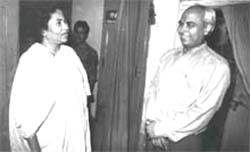A step too small
 it was inevitable. The international prices of oil rose. And on September 29, 2000 India followed suit and hiked the prices of all petroleum products. The hike, the government estimates, will help mop up an additional Rs 7,580 crore during the current fiscal year. Diesel's pre-tax price increased by Rs 2.30 a litre, petrol by Rs 3.60 a litre, kerosene by Rs 2.30 a litre. But experts feel that the price hike in the case of diesel and kerosene is too little and has arrived too late.
it was inevitable. The international prices of oil rose. And on September 29, 2000 India followed suit and hiked the prices of all petroleum products. The hike, the government estimates, will help mop up an additional Rs 7,580 crore during the current fiscal year. Diesel's pre-tax price increased by Rs 2.30 a litre, petrol by Rs 3.60 a litre, kerosene by Rs 2.30 a litre. But experts feel that the price hike in the case of diesel and kerosene is too little and has arrived too late.
Adding fuel to the fire is the "unjustified demand' made by Mamata Banerjee, the Union minister for railways. A day after the hike, she threw a tantrum. Then ensued the usual threat of resignation. She wants a roll back of the price rise, particularly in case of diesel. She says the rise is against public interest, suggesting that the price hike will consequently raise railway fares. Experts say its all a sham. Banerjee should realise that her charade of being pro-people will have grave consequences for the environment. "A roll back of the diesel price would mean unabated increase in the number of diesel vehicles, adding to the pollution on our roads,' says Anumita Roychowdhary, coordinator for the campaign for clear air of the Centre for Science and Environment, a Delhi-based non-governmental organisation. According to her, the hike is not sufficient enough and these
Related Content
- Order of the National Green Tribunal regarding protection of Zeilad Wildlife Sanctuary, Manipur, 20/03/2024
- Draft Jharkhand MSME promotion policy 2023
- Enhancing links of poor farmers to markets: a practice review for economic inclusion in Zambia
- Order of the National Green Tribunal regarding illegal operation of jaggery units, Narsinghpur, Madhya Pradesh, 11/01/2022
- Order of the National Green Tribunal regarding discharge of untreated sewage at Lar, district Deoria, Uttar Pradesh in open, 29/10/2021
- Order of the Patna High Court regarding management of COVID-19 situation in Bihar, 21/04/2021
